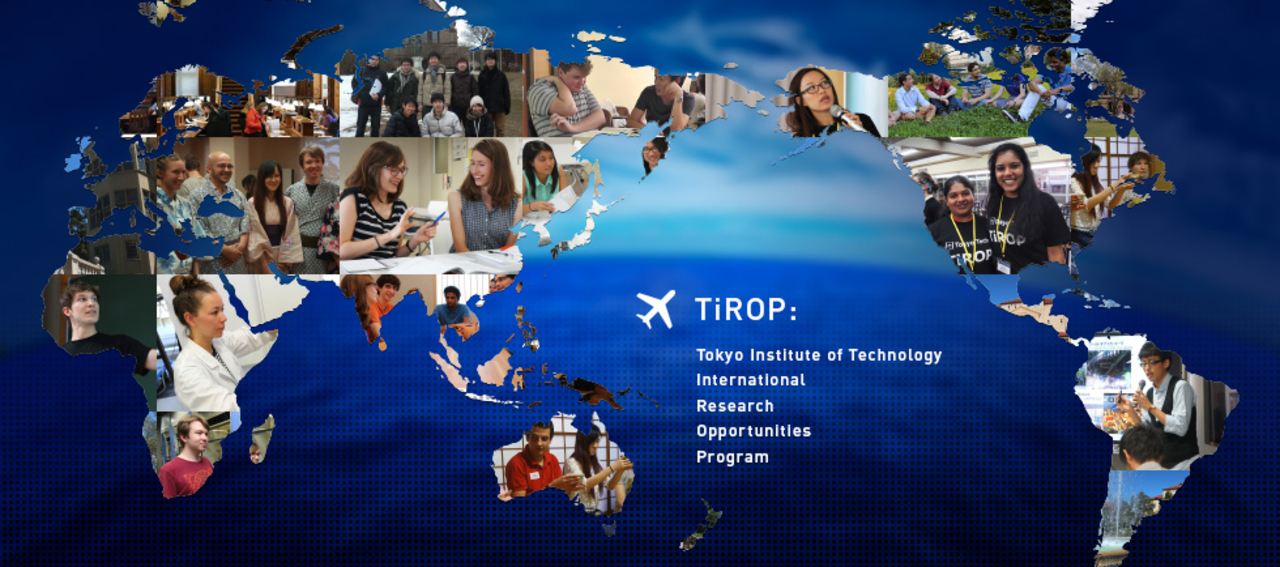
TiROP was conducted from AY2011 through AY2015.
Outline of TiROP
Tokyo Tech provides students with opportunities to establish networks with world-leading science and technology universities through joint educational and research exchange programs.
Tokyo Tech International Research Opportunities Program (TiROP) is a student exchange program started in 2011 between Tokyo Tech and 17 partner universities including California Institute of Technology, Carnegie Mellon University, Massachusetts Institute of Technology, and Imperial College London. The program is funded by the Ministry of Education, Culture, Sports, Science and Technology's (MEXT) funding scheme called the Re-Inventing Japan Project.
TiROP is unique in that it allows students to receive research supervision from academic supervisors of both Tokyo Tech and partner universities. The program aims to produce outstanding global leaders in the field of science and technology with a deep understanding of different cultures.
Partner universities
Our 17 world-leading partner universities are shown below.
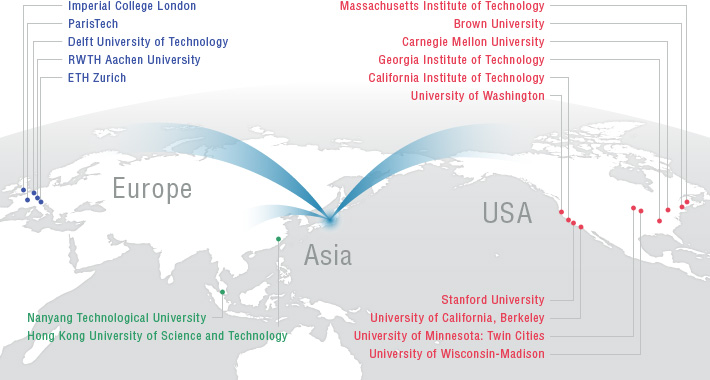
Studying abroad at Tokyo Tech: Summer Program
Summer Program Overview
TiROP accepts students from partner universities under two programs: Summer Program and Joint Educational Program.
Summer Program is an intensive program for conducting research at Tokyo Tech from June through August. Participants conduct short-term research projects in the labs of their interest. They can also take Japanese language courses and attend a number of cultural activities such as tea ceremony and rakugo performance (traditional Japanese comic storytelling). 24 students from 16 partner universities participated in the TiROP Summer Program in 2014.
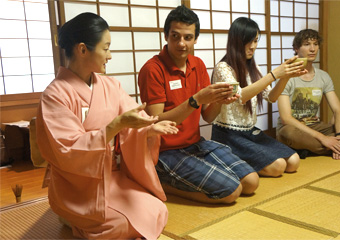
Tea ceremony
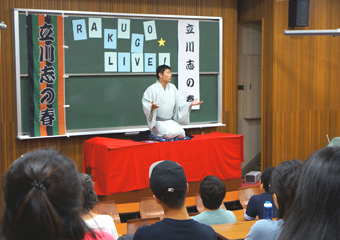
Rakugo performance
Comments from Summer Program participants
- Paul Zhang
3rd-year undergraduate student, Department of Computer Science, California Institute of Technology
-
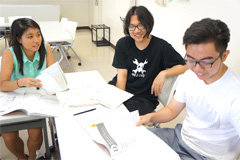
Zhang (center) in a Japanese Language class
Under the TiROP program, I researched Quantum Strongly Secure Ramp Secret Sharing.
This topic originates from "Secret Sharing" which is the task of dividing a secret into pieces so that a subset
of the pieces can reconstruct the secret while any less than that subset will have no information about the secret.
It can be thought of colloquially as dividing a picture into puzzle pieces so that any k pieces
of the puzzle will reveal the important part of the picture, while any less will be impossible to understand.
The "ramp" condition and the "strongly secure" condition are further variations that make secret sharing more convenient.
By replacing the secret with quantum information, the quantum analog is created.
I studied its quantum analog with Associate Professor Ryutaroh Matsumoto
and became first author of the manuscript now submitted for review.
Thanks to his close supervision and frequent discussions, the project went smoothly and successfully.
This TiROP experience has given me insight into education in Japan and academia in general.
I will likely visit Japan again in the future and believe that the TiROP program has prepared me for such an occasion.
From this experience I have also decided to pursue academia in the future.
- Anchal Bhargava
4th-year undergraduate student, Department of Mechanical Engineering, Carnegie Mellon University
-
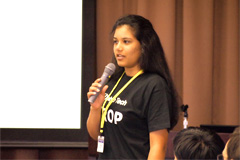
Bhargava presenting her research project
TiROP is very special in that students from all over the world are invited to Tokyo Tech to do research
in a field that interests them. The program took very good care of everyone and really encouraged global exchange at Tokyo Tech.
The school is very technological based, so there are a large variety of projects in all science disciplines,
which is sometimes difficult to find in the US. I did research on airfoil heat exchangers in the Department
of Energy Sciences, as my major is mechanical engineering. I was able to request the lab I wanted to work
in because of my interest in airplanes and engines. By the end of the summer,
I was able to create an ANSYS model that my adviser will use for his research.
This experience was very technical as I referenced my engineering background and classes in order to understand the project.
It has definitely made me a well-rounded person, which helps in searching for jobs.
As I will graduate soon from my undergraduate college, I am looking for a job instead of graduate schools.
I feel this experience has made me more global and has exposed me to different fields within my major.
- Robert Lawrence Smith
4th-year undergraduate student, Department of Electrical Engineering and Computer Science, Massachusetts Institute of Technology
-
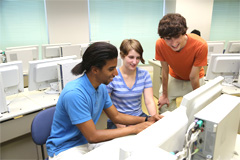
Smith (left) in a computer room
As clearly denoted in its name, TiROP is a research program that encourages its participants to engage in intellectual,
rigorous study, and guide them towards producing thought-provoking results, despite a relatively short stay.
My research centered on a fusion of 3D Graphics with 2D Disney-esque animation styles. At first,
progress was slow, with results far below my expectations. However, thanks to the support of my research lab
and TiROP peers, by the end of my 2 month stay, I had ultimately completed a significant milestone
in the form of a motion blur for meshes that simulated how a cartoon deforms when it moves at high speed.
I received a lot of positive feedback for it during my final presentation, which really encouraged me to continue working on it,
even after the program ended, and I had returned to MIT. Just as TiROP has been able to provide both academic and personal growth,
it has the potential to impact one's future career and lifestyle choices. For me, it's certainly both,
as I am considering working in Japan after I finish my Master's Thesis at MIT. If I do so,
I'm certain that what I've learned and experience via TiROP will help me to be more successful in this endeavor.
- Arianna Milena Sorba
3rd-year undergraduate student, Department of Physics, Imperial College London
-
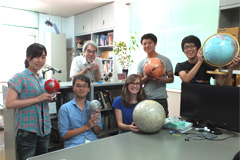
Sorba (third from right) with lab members
Tokyo Tech, and the city of Tokyo, was a wonderful place for me to conduct my summer research.
The TiROP program was incredibly well organized: it provided Japanese Language lessons,
gave help and advice on how to settle in Tokyo, and even organized cultural experiences,
such as a traditional Japanese tea ceremony, which I particularly enjoyed.
Meanwhile all the members of my lab were incredibly friendly, taking me out for meals and fireworks,
and my supervisor was extremely helpful and encouraging. My research was in Earth and Planetary Sciences,
looking at the moon's magnetic field. In particular I studied small magnetic anomalies measured
by lunar satellites, to try and ascertain whether the moon once had a dipolar magnetic field.
I found evidence of an ancient dipole that actually changed direction over the course of the moon's history,
which was very exciting! My experience at Tokyo Tech has greatly improved my self-confidence,
my independence, and my ability to adapt to new environments - skills that I hope to utilise in any future career.
In particular, I am currently considering undertaking a PhD,
and hope to use my research skills developed at Tokyo Tech to help me succeed in this goal.
Studying at partner universities: Short-term Visitor Program
Overview of the Short-term Visitor Program
TiROP offers three options to Tokyo Tech students for studying abroad at partner universities: research and coursework; research only; and Short-term Visitor Program.
Under the Short-term Visitor Program, Tokyo Tech undergraduates visit US partner universities for about ten days. This program prepares students for future long-term study abroad experience. Participants receive direct guidance from faculty members of their host universities and gain a good understanding of the study environment as well as research being conducted. In 2014, participants visited the Massachusetts Institute of Technology (MIT) and Georgia Institute of Technology (Georgia Tech).
Comments from Tokyo Tech participants
- Hiroshi Matsuo
3rd-year undergraduate student, Department of Mechanical Engineering and Science, School of Engineering
-
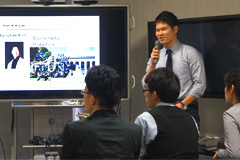
Matsuo giving a presentation about his visit
I was impressed by the number of machine tools they had at MIT's makerspace, which is called the Hobby Shop.
In terms of metal processing machinery, the Hobby Shop and Tokyo Tech's Collaboration Center for Design
and Manufacturing (CODAMA) were not much different. However, the Hobby Shop had more woodworking machines
and 3D printers, and students were free to create things that weren't necessarily related to their research, just as a hobby.
During the visit, I could sense the students' strong enthusiasm for studying.
Surprisingly, many of the classes didn't feel much different from those of Japanese universities.
Before the visit, I only had a vague desire to study abroad. Now, I consider studying abroad as an option to pursue
after entering graduate school.
- Kenta Kato
3rd-year undergraduate student, Department of Mechanical Engineering and Science, School of Engineering
-
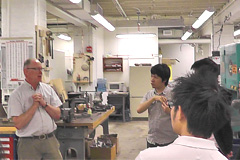
Kenta Kato (center) at the MIT Hobby Shop
I audited a course at Georgia Tech and noticed that they spend more time learning
about machine component design than we do at Tokyo Tech. Machines wear out through continuous use,
so engineers need to be knowledgeable about the lifespan of various components.
Georgia Tech teaches machine component design as a subject of its own rather than as an aspect
of technical drawing or other subjects. In addition, the university focuses on practical learning
and allows students to have easy access to equipment such as 3D printers.
I was impressed by the environment that enables students to focus on long-term research.
This visit reminded me that there is competition all around the world.
- Hokuto Kato
4th-year undergraduate student, Department of Bioscience, School of Bioscience and Biotechnology
-
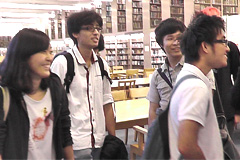
Hokuto Kato (center) in a library at MIT
I noticed that students at Georgia Tech are very proactive in class. It is uncommon in Japan for students
to interrupt a class to ask questions or respond to every question posed by the lecturer.
There are various facilities from the 1996 Atlanta Summer Olympics on campus, and I was surprised
to learn that the pools are still being used by the students and the buildings of the Olympic Village had been turned
into dormitories.
I visited a laboratory at MIT and observed an experiment that involved behavioral testing of rats and monkeys.
The experiment measured the animals' levels of neurotransmitters such as dopamine
and other substances to study their brain activities.
Being in a different atmosphere and seeing new experimental instruments motivated me a lot.
Promoting internationalization
TiROP continues to produce global leaders with strong problem solving skills and ability to lead international projects.
In 2014, Tokyo Tech was chosen as one of the universities of the Top Global University Project--a MEXT funded project
that aims to intensively support universities that deliver world-class education and research
in order to enhance Japan's international competitiveness.
Tokyo Tech will promote further internationalization through these projects
and continued cooperation with world-leading universities.
Video: TiROP Summer Program Student Testimonials
The Special Topics component of the Tokyo Tech Website shines a spotlight on recent developments in research and education, achievements of its community members, and special events and news from the Institute.
Past features can be viewed in the Special Topics Gallery.
Published: December 2014
. Any information published on this site will be valid in relation to Science Tokyo.














